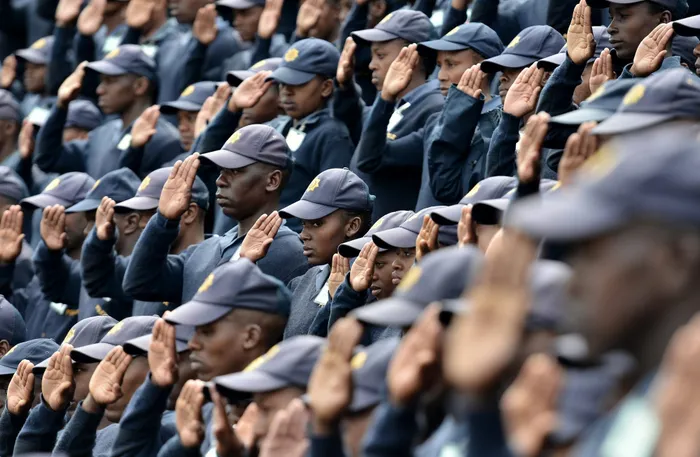Call for urgent reforms as South African police struggle with overwhelming workload and mental health issues

Experts call for urgent reforms to support police officers' well-being and effectiveness. Pictured are SAPS trainees on parade.
Image: PHILL MAGAKOE
South African Police officers are under pressure with one cop having to cater to nearly half a million population, and the workload resulting in mental health issues, according to experts.
National Police spokesperson Brigadier Athlenda Mathe said South Africa has more than 180 000 police officers.
However, according to the latest South African Police Service (SAPS) annual report, more than 30 000 of these are administrative support employed under the Public Service Act, which leaves the SAPS with just above 150 000 trained police officers who are responsible for crime fighting and employed under the SAPS Act.
The numbers show that each officer has to look after more than 400 000 people.
Lesiba Thobakgale, Spokesperson for the South African Policing Union (SAPU), said police are overworked as the SAPS is underresourced both on the physical and human capital front, versus the population of South Africa.
He added that the ratio is above the recommended ratio determined by the United Nations of 1=220.
“There is more that needs to be done to protect police officers, as we still see police station attacks and police killings. The SAPS issued guidelines in terms of police safety, which are insufficient.
“Police are underpaid, and the risk they are exposed to is high. However, we appreciate improvements on conditions of service like service allowances, which need to be improved further,” Thobakgale said.
He said there is a need to improve on the technological front as the world of work keeps evolving, and on equipment that can be used to fight and investigate crime.
He expressed support for the introduction of body cams, which will assist with police killings as well as identify perpetrators.
Thobakgale added that the Employee Health and Wellness component should be equipped with necessary professionals who can debrief members after a traumatic event, because mental health is critical given the job's stressful nature.

Dr Johan Burger, an independent crime and policing consultant says that the SAPS is constrained by various factors and conditions including population growth which outstripps the growth in police numbers.
Image: Supplied
Dr Johan Burger, an Independent crime and policing consultant, said the SAPS is under constant pressure to reduce and prevent crime, but are constrained by various factors and conditions such as population growth, which is outstripping the growth in police numbers.
“For example, police numbers dropped by almost 10% from 154 748 in 2010/11 to 139 901 in 2020/21, whereas the population increased by 10 million, from 50 to 60 million. The implications of the decline in police numbers are shown in the police-population ratio which dropped from 1:323 to 1:430 by 2020/21. By 2023/24, police numbers increased to 150 388 while the population increased to more than 62 million. That leaves us with a police-public ratio of 1:412 which is still far from the 1:323 we had in 2010,” Burger said.
He added that while the police numbers are declining compared to population growth, the police are expected to win the fight against crime, but this in fact, becomes impossible.
"We only have to look at our murder rate, which has been on the increase since 2012, after 18 years of consistent decrease. There was one exception in the upward trend with a drop in 2020 from 35.5 to 33.1 per 100 000, due to the so-called Covid-dip. This tendency is evident in most violent crimes,” he said.
The apparent decline in police performance and the ostensible failure to turn the organisation around is an important contributing factor, but certainly not the only reason South Africa appears to be fighting a losing battle against crime, Burger explained.
He said that the aggravated robbery, which comprises seven sub-categories inclusive of cash-in-transit robberies, house and business robberies and car hijackings, have increased by 49% over the same period.
It is difficult to provide reasons for the various failures of the police but it is important to understand that these failures are not the only reasons why crime in South Africa has reached critical levels. There is, for example, very little that the police can do about the many socio-economic conditions that are regarded as causal factors or drivers of crime, Burger said.
Socio-economic conditions include factors such as unemployment and rising levels of poverty, frustration caused by these conditions and subsequent social conditions, drug and alcohol abuse, low levels of tolerance due to the resulting frustration, etc.
“The most frustrating thing in this whole scenario is that while the police, along with a number of other government departments agreed that the fight against crime is a shared responsibility and not just that of the police, adopted a national integrated crime and violence prevention strategy (ICVPS) in 2022, but very little appears to be happening.
“There needs to be a visible joint effort by the relevant government departments about what they are doing jointly and separately towards the implementation of the ICVPS, but there is very little, if anything, reported in this regard. So we simply don’t know whether this joint strategy is working or not and therefore we should be looking at the performance of more than only the police in determining reasons for our inability to bring crime under control,” Burger said.
He said the president, Cyril Ramaphosa or one of the ministers in the Cabinet should at least once a year update the public about the progress or successes of the ICVPS.
He added that it is difficult to assess the workload of the police as their workload is varied and multi-faceted.
“If we look at the detectives, it is obvious that they are overwhelmed, struggling with staffing shortages and rising caseloads. This causes a ripple effect as detectives find it increasingly difficult to conduct thorough investigations, leading to a decline in detection and an increase in dockets being closed and filed due to a lack of evidence,” he said.
In August 2024, in a written reply to Parliament, Police Minister Senzo Mchunu suggested as a possible reason for the detectives’ poor investigative performance, their current workforce of about 22 400, excluding the Hawks, is nearly 8 600 or 28% below the fixed establishment of 31 000 detectives. Keep in mind that over the last 12 years, murder increased by 51% and aggravated robbery by 49%. And every increase means more case dockets, he said.
“Police officials are our main line of defence, but they also face a daily threat to their lives. Last year alone, 111 police officers were killed, approximately 40% on duty and the rest off duty. Of course, this will have a negative impact on their morale and their ability to perform their duties. Studies have also shown that police officials are often reluctant to report for and attend programmes aimed at dealing with cases of stress and trauma. This is probably linked to the police specific culture and related conditions,” Burger said.

Tholinhlanhla Dlamini-Ngcoya, a councelling psychologist emphasises the need for law enforcement officers to seek mental health.
Image: Supplied
Tholinhlanhla Dlamini-Ngcoya, a counselling psychologist who has worked with various law enforcement agencies, including the SANDF, said the most prevalent mental health diagnoses are major depression, post-traumatic stress disorder (PTSD) and generalised anxiety.
“There is no way you could be in law enforcement without experiencing mental health issues. Whether it affects you directly or indirectly, because, as you leave your house, you don’t know if you’re coming back or not, and that causes anxiety. Even a call to attend to a crime scene is anxiety-provoking, because it’s between you and the criminals.
“With depression, there is a lack of resources. So, officers are under a lot of pressure and a lot of stress because they are probably finding it difficult to do their work,” Dlamini-Ngcoya said.
She said long, irregular hours and shift work lead to burnout, fatigue, lack of sleep (insomnia) and eating disorders, which all add to stress.
This is because officers are not resting, and there is not enough time to exercise and their appetites are affected. It's either one is gaining weight without trying or losing weight without trying.
“Burnout also affects your temper even at home, and people who suffer from burnout tend to be short-tempered and snap. That's when people would start being abusive. and it’s just because you have not rested.
“About PTSD, when you’re attending to a crime, you are exposed to a traumatic event and you miss the bullet again and again. So that trauma comes back and it affects you. Then you become depressed. If your depression is not attended to, it can lead to suicidal thoughts. Some, when they are suicidal, don’t want to die and leave their families behind. So sometimes that's when you’ll find that a partner will kill their partner and kids,” Dlamini-Ngcoya said.
She added that sometimes “it’s out of, I love them so much that I can’t leave them behind. Sometimes it’s because they have blacked out and didn’t realise they were actually doing it at the spur of the moment — and at that moment, it just happens.”
She said this is part of mental health because one is not thinking straight. Their mind is going to the worst-case scenario, which is — I might as well die. I might as well kill. The brain is not working to its full capacity.
There is still a lot of stigma in general when it comes to mental health issues, she said.
“The fact that you are an officer doesn’t mean you are not a human being who’s been socialised to think that seeking mental health assistance is being weak and all of those things.
The notion of by virtue of being an officer, means you are strong, you are resilient to pain and other things. When you then seek help, you come across as weak, and so officers are scared.”
She said some would come to a psychologist, but be mindful of what they share, because if you are found to be mentally unwell, you become unfit to carry a firearm.
“There is a protected disclosure when you speak to a psychologist, however, a breach is compulsory if you are a danger to society or yourself. So, out of fear of losing a job, fear of being demoted, fear of being misunderstood at work, then people don’t come to psychologists,” she said.
Seeking mental health assistance amongst officers needs to be normalised. It should be compulsory. It needs to come from the top. It should be rewarded as a good thing that an officer is taking care of his or her mental health. There should be a specified period to examine if one is not being affected mentally. To do the work that they do is really mentally draining, Dlamini-Ngcoya said.
Mathe said the Project 10 000 is in place where the SAPS recruits and trains 10 000 officers each financial year.
“Every year, budget allocation to ensure more and better resources is set aside. We have the police safety strategy in place that looks at the safety of members on and off duty. We look at ensuring adequate training and that members are in possession of adequate and working equipment and resources, and they have protective gear, etc.
“We have an Employee Health and Wellness unit consisting of psychologists, social workers and chaplains, their services are available 24/7 and 365 days a week. Members go for a debriefing session within 72 hours of attending traumatic scenes. The management leads SAPS wellness days and promotes and encourages members to attend counselling and debriefing sessions,” Mathe said.
She added that the SAPS is constantly resourcing all service points with a priority on the grassroots level of policing at stations, and they have an ethical strategy which demands that SAPS employees act with integrity and respect for people’s diversity and the law, thereby enhancing service excellence to the approval of the public.
gcwalisile.khanyile@inl.co.za